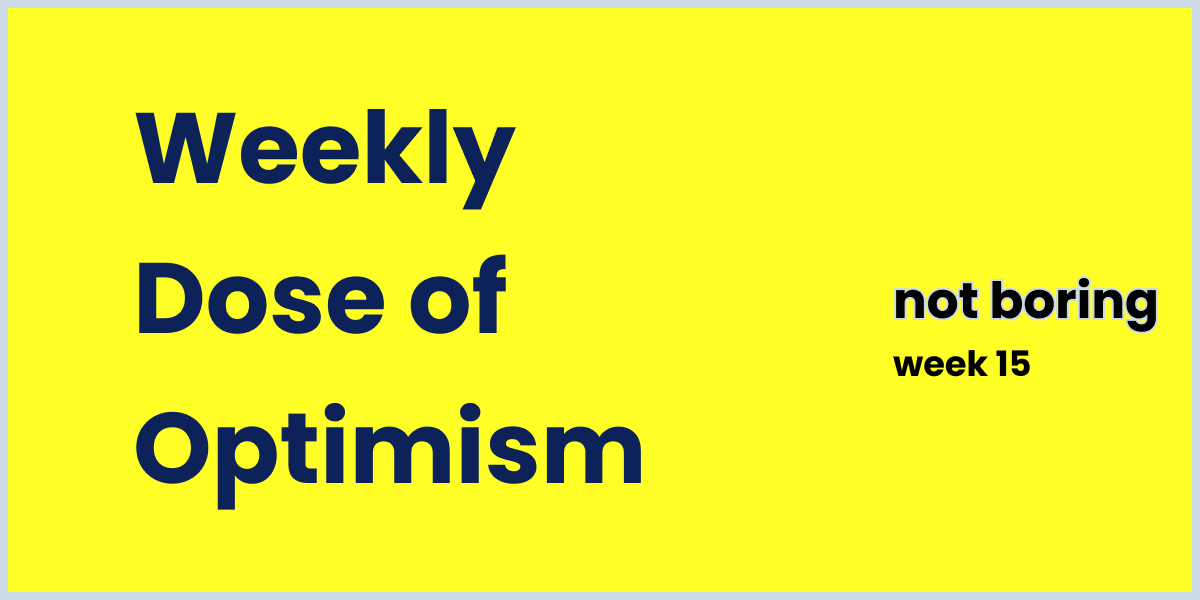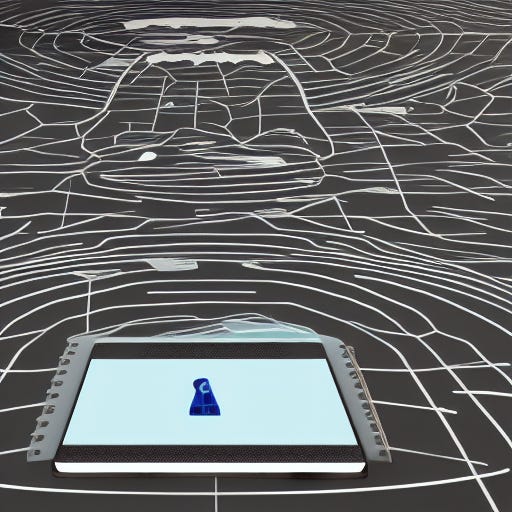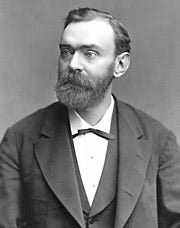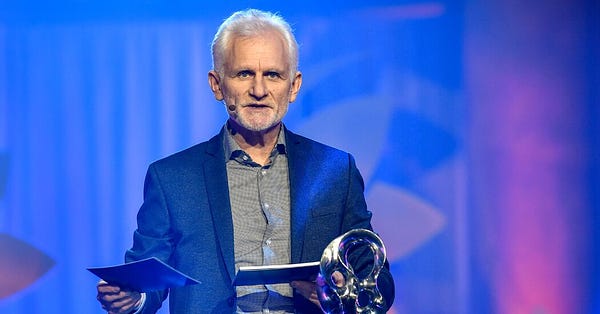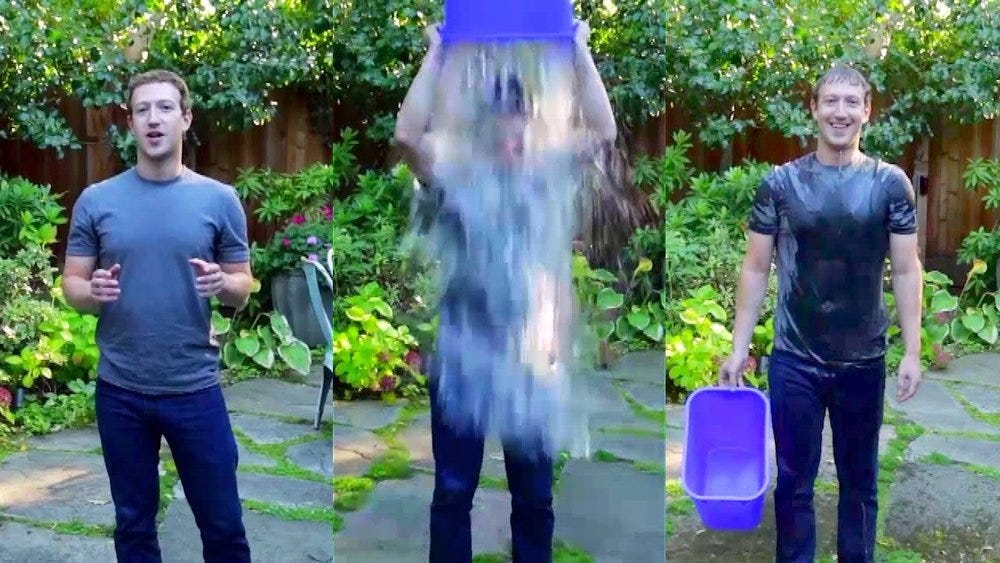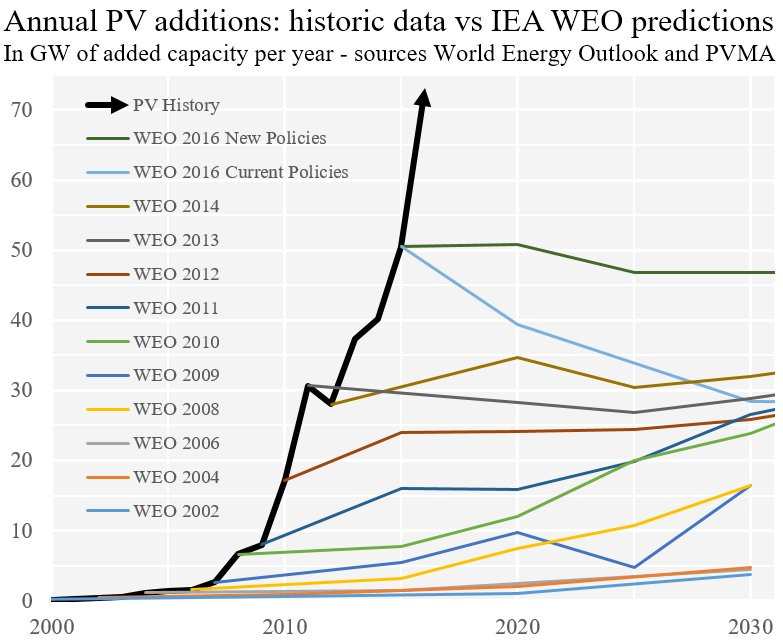

Weekly Dose of Optimism #15
source link: https://www.notboring.co/p/weekly-dose-of-optimism-15
Go to the source link to view the article. You can view the picture content, updated content and better typesetting reading experience. If the link is broken, please click the button below to view the snapshot at that time.
Weekly Dose of Optimism #15
Democratizing AI, Nobel Prizes, Eradicating Malaria, Ice Bucket Challenge, and Green Hydrogen
Come for the Optimism, stay for the in-depth analyses of tech companies and trends:
Hi friends 👋,
Happy Friday and welcome to our 15th Weekly Dose of Optimism. For those that have this Monday off, enjoy the long weekend. Not Boring does not have off and we’ll be in your inbox by 9am EST.
Let’s get to it.
(1) An Interview With Daniel Gross and Nat Friedman About the Democratization of AI
Ben Thompson for Stratechery
The visual component of AI just arrests people so much more, even though we already had GPT-3 and all those sorts of things. A picture is worth a thousand words, it’s definitely the case as far as AI stuff goes, but they had all these controls, all these limitations, it was invite-only. It fed into the assumption, the conventional wisdom — which I held — that AI is going to be this centralized thing, you need all this access to data.
Then this summer happens and, first, Midjourney comes along, and it’s just from a user perspective a Discord server, and you can generate these amazing images for free — we can get into the cost issues in a little bit. Then the bomb drops, which is Stable Diffusion, where now to go back to your open source thing, it’s this availability and the iteration that we’ve seen even the last little bit has been crazy and it’s been a real — there’s an emoji with the mind exploding (), that’s been me for the last two months. Every single assumption I had about this space has feels like it’s been upset.
Seemingly everyday there’s a new AI release that captivates the attention and imagination of the internet. It feels like we’re in the early Golden Days of Democratized AI and on the precipice of some major changes in the tech industry.
We’re not alone in feeling this way — the movement has caught the attention of some of the most sophisticated people in tech. This conversation is among three such people: Ben Thompson (author of Stratechery), Nat Friedman (former CEO of GitHub, founder of AI Grant, and investor), and Daniel Gross (founder of Cue, founder of YC’s AI program, and former Director working on ML projects at Apple).
This conversation is one of the more detailed but approachable I’ve come across on how and why all of this progress in AI is happening, seemingly overnight. It gives a good recent history of different approaches, explanations of how they work, and an inside look at how Nat and the team at GitHub created CoPilot, the popular AI pair programmer. They make a fascinating observation, that the internet was only a necessary precursor — we needed to digitize the world’s information for AI models to be able to learn from all of it — and that the real progress, and deflationary impact, is still to come.
(2) The Nobel Prize Announcements
We’re in Nobel Prize Season! Each weekday from Monday, October 3rd through Monday, October 10th, a Nobel Prize will be awarded to those who have “conferred the greatest benefit to humankind.” The six prizes are awarded for work in Physics, Chemistry, Medicine, Literature, Peace, and Economic Sciences. As of writing, we’re five prizes in. Here are brief summaries directly from the Nobel website:
Physics: Awarded to Alain Aspect, John F. Clauser and Anton Zeilinger “for experiments with entangled photons, establishing the violation of Bell inequalities and pioneering quantum information science”. Their results have cleared the way for new technology based upon quantum information.
Check out this Scientific American article (h/t Quinn Emmett) for a deeper and trippier explanation of this one.
Chemistry: Sometimes simple answers are the best. Barry Sharpless and Morten Meldal are awarded the Nobel Prize in Chemistry 2022 because they brought chemistry into the era of functionalism and laid the foundations of click chemistry. They share the prize with Carolyn Bertozzi, who took click chemistry to a new dimension and began using it to map cells. Her bioorthogonal reactions are now contributing to more targeted cancer treatments, among many other applications.
Commentary from Not Boring writer/investor Elliot Hershberg (who happens to work in Bertozzi’s building at Stanford): I'm really happy about this choice! The combination of click chemistry and bioorthogonal reactions has been a massive unlock for labeling and measuring cells and biological processes without disrupting them. As the names suggests, it lets you click together molecules in a much more modular and engineerable way, without introducing toxicity to cells. It's great to see recognition for the value of tools/engineering in science!
Medicine: Svante Pääbo accomplished something seemingly impossible: sequencing the genome of the Neanderthal, an extinct relative of present-day humans. He also made the sensational discovery of a previously unknown hominin, Denisova. Importantly, Pääbo also found that gene transfer had occurred from these now extinct hominins to Homo sapiens following the migration out of Africa around 70,000 years ago. This ancient flow of genes to present-day humans has physiological relevance today, for example affecting how our immune system reacts to infections.
Literature: Awarded to the French author Annie Ernaux “for the courage and clinical acuity with which she uncovers the roots, estrangements and collective restraints of personal memory.” In her writing, Ernaux consistently and from different angles, examines a life marked by strong disparities regarding gender, language and class. Her path to authorship was long and arduous.
Peace:The 2022 Nobel Peace Prize is awarded to human rights advocate Ales Bialiatski from Belarus, the Russian human rights organisation Memorial and the Ukrainian human rights organisation Center for Civil Liberties.
Humans can be wicked smaht. We can do and discover things sacks of meat and chemicals have no business doing and discovering. This year’s winners are a great reminder of that.
(3) At Long Last, Can Malaria Be Eradicated?
Apoorva Mandavilli for The New York Times
“I think there’s so much room for optimism,” said Philip Welkhoff, director for malaria programs at the Bill and Melinda Gates Foundation. “Later this decade, we could actually launch a push that gets us all the way to zero.”
The medical and philanthropic worlds have been making progress in the fight against malaria for decades, with treatments becoming more efficacious and widely distributed. While malaria still causes over 600,000 deaths per year, mostly of young children in sub-Saharan African, there is hope that a flurry of new vaccines could completely eradicate the disease in the coming years.
This one hits close to home: my sister, Meghan, who lives in Accra, Ghana and travels throughout the African continent, was infected with a rather serious case of malaria this summer and spent weeks in the hospital. Luckily, when the symptoms hit, she happened to be traveling in the UK, where the health system is far more advanced than those in areas where most malaria patients live. So while these medical advances will go a long way towards lowering the quantity and riskiness of each case, true eradication can only happen when the treatments are widely distributed into the communities that are the hardest to reach.
(4) The Ice Bucket Challenge wasn't just for social media. It helped fund a new ALS drug
Wynne Davis for NPR
The ALS Association said that $2.2 million of funds that were raised from the Ice Bucket Challenge went into funding the development and trial of the new drug that the Food and Drug Administration approved this week for treatment of ALS, which is also known as Lou Gehrig's disease.
Remember the Ice Bucket Challenge?
It’s easy to forget the positives of social media. Teen depression and suicide, cyberbullying, spreading of false information, and general disconnection from the “real world.” These are all very serious issues for which, rightfully, social media companies have been taken to task over the past few years. And the benefits of social media — what are they again? Connecting with loved ones? Access to information? These seem less like "benefits” and more just table stakes for the world we live in today. Social media has become so entrenched, that its benefits are hard to discern from everyday life. We expect these things. I am sure there is a name for this bias — bad things standout as bad and good things become expected — but it escapes me.
So it’s rare that we’re able to so clearly connect the dots between a social media phenomena and a positive outcome. The ALS Ice Bucket Challenge is one such instance: the money raised during the challenge back in 2014 actually went directly (as far as we can tell) towards developing a drug that can help treat ALS. The new treatment, which was approved by the FDA this week, does not cure ALS but it does slow down the effects.
The novel idea of a viral online challenge to raise money and awareness for a specific cause is, of course, no longer novel. Imagine getting a Facebook notification that your classmate from 6th grade who you haven’t talked to in a nearly two decades tagged you in a “XYZ Viral Challenge” today — it might be the final straw that pushes you to finally delete the app. But we’ll always have those simpler internet times of 2014 to look back on, and new ways of harnessing technology for fun and good to look forward to.
(5) I come bringing good news about hydrogen
Noah Smith for Noahpinion
Notice that all of these uses have one thing in common — they’re all ways of replacing fossil fuels for things we already do. Tons of things in our economy rely on burning stuff; hydrogen is simply a flammable chemical that doesn’t release carbon when you burn it. This is why my optimism about green hydrogen is a lot more moderate and tempered than my optimism about batteries — whereas batteries enable us to do lots of things we can’t currently do at all, green hydrogen pretty much just replaces things we already know how to do.
Noah Smith starts out his essay on green hydrogen, writing, “this is a techno-optimist blog, and it’s time for another techno-optimist post.” Well, Noah, the Weekly Dose of Optimism is a blog about techno-optimist blogs, so if you’re going to keep producing fantastic techno-optimists posts, we’re going to keep covering them 🤝.
The central observation behind the article is that green hydrogen is following a similar “learning curve” to solar, wind, and battery technologies. The technologies have been getting cheaper, and as they’ve gotten cheaper, we’ve built more of them, which makes them even cheaper. Learning curves are seemingly harder to spot than you’d think and most people had written off hydrogen — but curve don’t lie. Sure, hydrogen might not power cars (although Terraform and others are working on making clean fuels using hydrogen) but green hydrogen energy can replace many other activities we already do using fossil fuels. In an era of energy abundance, we’ll need some forms of energy to unlock whole new capabilities (like batteries) while others will just need to make existing activities greener (like hydrogen.)
That’s all for this week. If you enjoyed this week’s email, please share it with a friend or two!
I’ll be back in your inbox 9am EST on Monday morning. Enjoy the weekend.
Packy
Recommend
About Joyk
Aggregate valuable and interesting links.
Joyk means Joy of geeK
